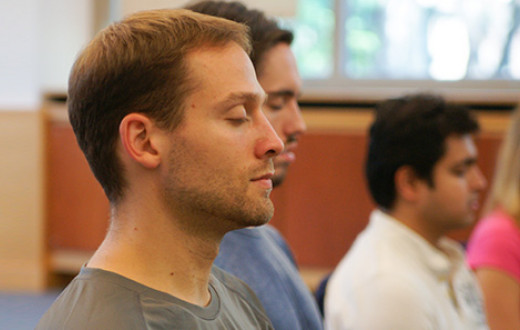
(Below is the continuation of the post Putting Wisdom To Work)
You have done all that you wanted to do; you have achieved. You got everything, and whatever you want also, you are getting, then what next? This is a question that sometimes comes up. If it comes up then you are still alive. If this question, 'What next' doesn't arise, that means somewhere you are sleeping. If this question arises, then starts the path towards freedom, towards liberation. And liberation comes only with the light (Guru).
Everyone wants freedom to some extent or the other. Freedom from everything is liberation. Now, don't ask me, "What is everything? Is it also freedom from love, from knowledge, from joy or bliss?" Come on, all of these don't bind you at all. Knowledge doesn't bind you.
Knowledge along with love, in the beginning, appears to bind you, but really it is setting you free. It is to free you from small things that it is binding.
You can ask, "Is the love for the Guru not binding?" I say, "Yes, it is binding, so that you can be free from everything else". So one can be free from everything, all these small little irritants in life, and you will be free from all that, so you can get that freedom. So to get these aspects in life, one has to have the Guru Principle (the guiding light) and that is why Guru Purnima is celebrated.
We don't know from how long this is being celebrated. From ages people have been celebrating Guru Purnima.
Many of you might have watched what I spoke yesterday -- that Guru Purnima is an Oxymoron. Purnima means that which belongs to the Moon, and Moon signifies emotions, while the Guru means wisdom. Life is as such a combination of wisdom and refinement. and fullness of emotion. Emotion that is incomplete binds you, but emotion which is complete, which is full, like a full moon brings freedom. Knowledge and wisdom bring freedom.
If we sit and analyze things like this, we can see some new knowledge appear every day. There is no end to knowledge.
There was a great saint in India some 5200 to 5300 years ago, maybe even more. We don't know the exact dates. He organized knowledge. See knowledge has been there at all times. When we organize that into a Happiness Program, into course points, then you learn the essence of hollow and empty (taught in The Art of Silence Program). So when you organize knowledge, you are able to integrate that in life.
Similarly, knowledge was there but Ved Vyasa was a Rishi who organized it, and his organization was so fantastic.
There is a story that is said about this saint. Ved Vyasa went to the creator and asked God to give him knowledge. The creative energy showed him a huge mountain of knowledge saying, "This is knowledge, you wanted knowledge, take it".
Ved Vyasa went and grabbed two handfuls, put it in his pocket and then took two handfuls more. That's all that he could grab from all that was there. And then he organized the knowledge that he took into four Vedas. This is what it is! Knowledge is infinite, but from that Rishi Ved Vyasa organized it into four Vedas, and then all the Upanishads. The whole Vedic knowledge and Vedic literature was organized by him, including the Mahabharata (the grand Epic of India was also written by him). The eighteen Puranas were also written by him. So it is said, anything in the world, whatever you see, Ved Vyasa has already tasted and tested it. There is nothing that is left without his touch. He has touched on every aspect, every field of human existence -- logic, music, dance, Ayurveda, archery, architecture, meteorology, political science, economic science, Earth science -- you name it and it all has had touch of Ved Vyasa. So he organized it categorically. So Guru Purnima is also called Vyasa Purnima, and is celebrated in his memory because he made it easier for people to learn the spiritual and the unknown aspects of life, and rejoice in the benefits of human life.
Today, we did Guru Puja (a form of thanksgiving) to all the Masters from time immemorial. We start from Narayana (the very beginning of human life). Narayana begins with the first human existence on the planet around 19 billion years ago. That's why they say this knowledge is timeless.
Then Padmabhavam, and then Vashistha, a great Rishi. It's said, Vashistha is born in every creation, in every planet to bring knowledge to the human race. What Vashistha had said several years ago is what scientists are talking about today. He had spoken about Dark Matter and Dark Energy. He had spoken about the three spaces -- inner space, outer space and the causal space. Science today is coming very close to what Vashistha had said and there is also a thought that Vashistha is almost like a degree or a position more than a person. Like you have a judge or a doctor, like that people say Vashistha is a position.
Same is said for Rishi Ved Vyasa. Whenever a Rishi, or anyone is giving a talk or a discourse sitting on a seat, this is called the Seat of Vyasa. It's called a Vyasapith. When a teacher teaches, the seat of the teacher is called the Seat of Vyasa. So every Guru sits on a Vyasapith. There are many teachers here, when you are sitting and giving some knowledge, that seat is called the Seat of Vyasa. You are sitting there and giving knowledge without any selfish motive, with a pure heart; with one intention to bring benefit to all, then that is Vyasapith. Not every school teacher's seat is called the Seat of Vyasa, no! Many school teachers are teaching because they are getting some benefit out of that. I wouldn't call that Vyasapith. Vyasapith or Seat of Vyasa is that seat from where selflessly you are giving knowledge or being a channel for knowledge to flow through.
Today, we remember and show our gratefulness to this ancient tradition of Masters from time immemorial -- Vyasa, Vashistha, Shakti and Parashara (ancient Masters).
Parashara was a great author of astronomy and astrology. Just imagine, some 7000 to 8000 thousand years ago, they said that there are many moons to Jupiter. Even today, the Parashara Hora Shastra (foundational compilation of Indian Astrology) is correct to the fraction of seconds. It gives the exact timing of Sunset, Lunar Eclipse, Solar Eclipse, and the transiting of the planets. All the calculations are done and are accurate.
The concept of zero came from Padmabhava. and then Vashistha, then Shakti and then Parashara. Many of the knowledge books are not available now. They were lost in the late 16th century when India came under different rulers. At that time, people just burnt libraries and so many of those scriptures were lost. But Parashara's knowledge of astrology and astronomy is in use even today in use.
So like that, the whole tradition has brought immense benefit to mankind and this has been protected and saved and brought to present day.






























